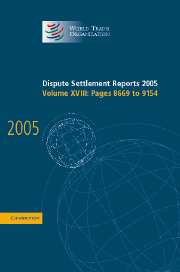Book contents
- Frontmatter
- Contents
- European Communities – Countervailing Measures on Dynamic Random Access Memory Chips from Korea (WT/DS299): Report of the Panel
- United States – Countervailing Measures Concerning Certain Products from the European Communities - Recourse to Article 21.5 of the Understanding on the Rules and Procedures Governing the Settlement of Disputes by the European Communities (WT/DS212): Report of the Panel
- Cumulative List of Published Disputes
European Communities – Countervailing Measures on Dynamic Random Access Memory Chips from Korea (WT/DS299): Report of the Panel
Published online by Cambridge University Press: 13 December 2017
- Frontmatter
- Contents
- European Communities – Countervailing Measures on Dynamic Random Access Memory Chips from Korea (WT/DS299): Report of the Panel
- United States – Countervailing Measures Concerning Certain Products from the European Communities - Recourse to Article 21.5 of the Understanding on the Rules and Procedures Governing the Settlement of Disputes by the European Communities (WT/DS212): Report of the Panel
- Cumulative List of Published Disputes
Summary
INTRODUCTION
Complaint of Korea
On 25 July 2003, the Government of Korea (“Korea”) requested consultations with the European Communities (“EC”) pursuant to Article 4 of the Understanding on Rules and Procedures Governing the Settlement of Disputes (“DSU”), Article 30 of the Agreement on Subsidies and Countervailing Measures (“SCM Agreement”), and Article XXII of the General Agreement on Tariffs and Trade 1994 (“GATT 1994”), with regard to the provisional countervailing measures imposed on dynamic random access memory chips (“DRAMs”) from Korea, as announced in Commission Regulation (EC) No. 708/2003 and published in the Official Journal of the EC on 24 April 2003, and with regard to any final measures on the same products. A first round of consultations took place on 21 August 2003.
On 25 August 2003, Korea requested further consultations with the EC pursuant to Article 4 of the DSU, Article 30 of the SCM Agreement, and Article XXII of the GATT 1994, with regard to the EC's final countervailing measures imposed on DRAMs from Korea, as adopted by the Council on 11 August 2003 through Regulation No. 1480/2003 and subsequently published in the Official Journal of the EC on 22 August 2003. Korea and the EC held a second round of consultations on 8 October 2003, but failed to reach a mutually satisfactory resolution of the matter.
On 19 November 2003, Korea requested the establishment of a Panel to examine the matter.
Establishment and Composition of the Panel
At its meeting on 23 January 2004, the DSB established a Panel in accordance with Article 6 of the DSU and pursuant to the request made by Korea in document WT/DS299/2.
At that meeting, the parties to the dispute also agreed that the Panel should have standard terms of reference. The terms of reference are, therefore, the following:
“[t]o examine, in the light of the relevant provisions of the covered agreements cited by Korea in document WT/DS299/2, the matter referred by Korea to the DSB in that document, and to make such findings as will assist the DSB in making the recommendations or in giving the rulings provided for in those agreements.”
- Type
- Chapter
- Information
- Dispute Settlement Reports 2005 , pp. 8671 - 8949Publisher: Cambridge University PressPrint publication year: 2007

